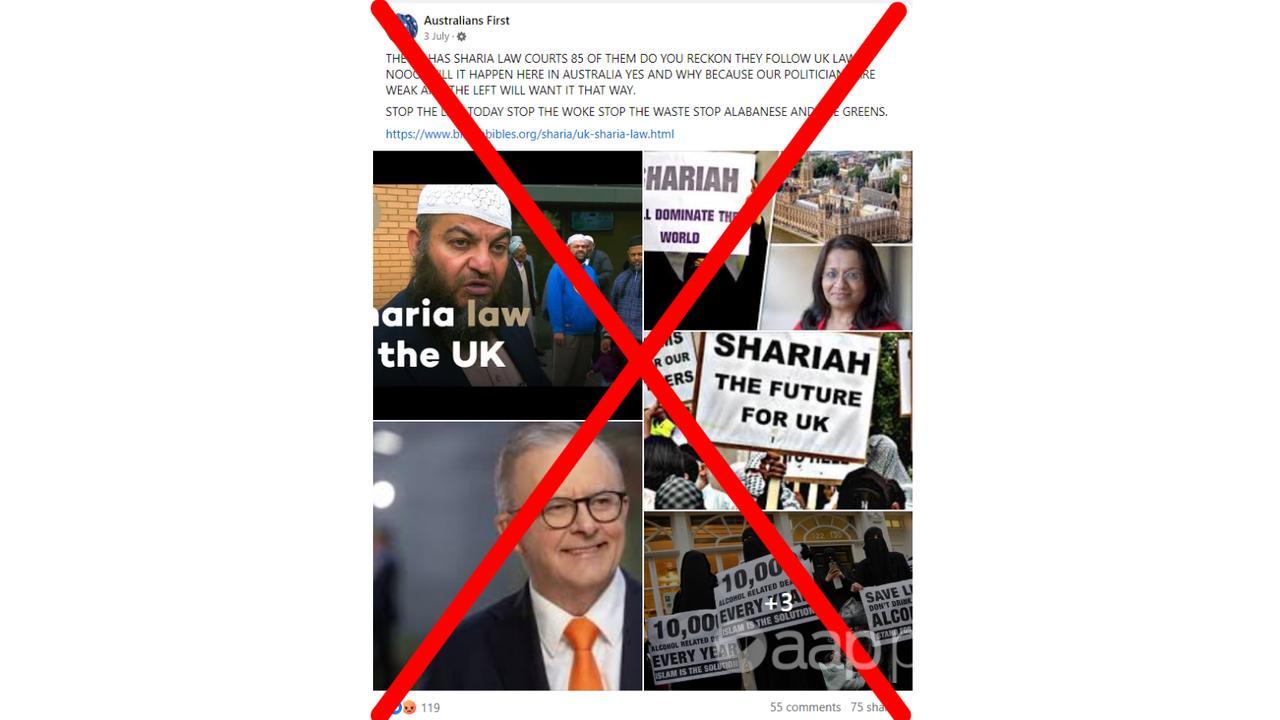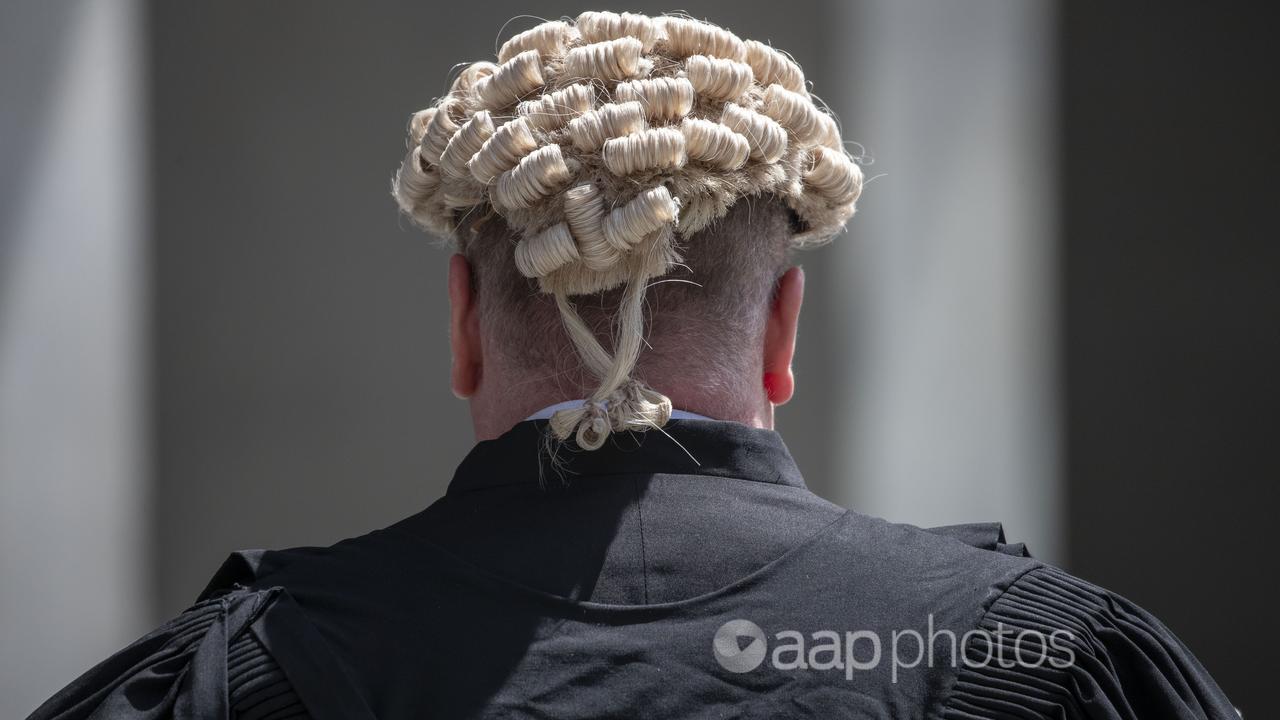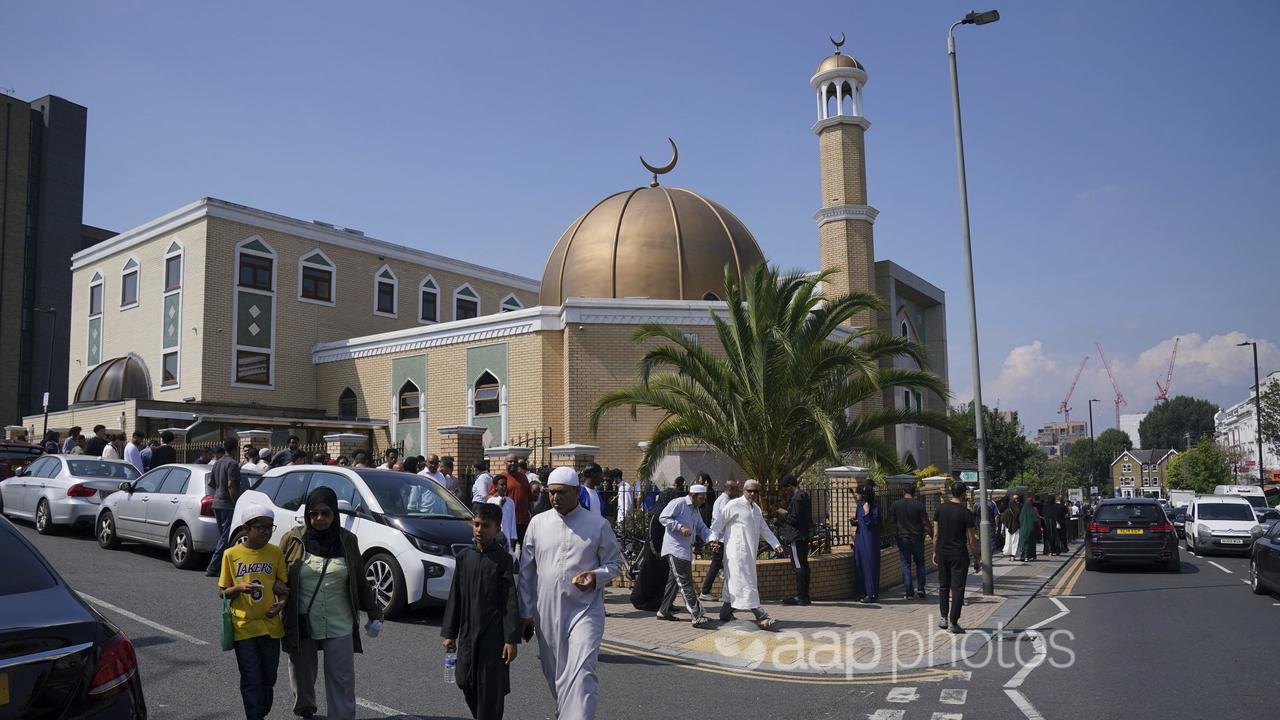AAP FACTCHECK – The UK officially recognises sharia law courts which operate within the country’s legal system, it is being claimed.
This is false. Sharia courts do not operate within the UK’s legal system, nor are they officially recognised.
The claim is made in a Facebook post and linked web page.
“”THE UK HAS SHARIA LAW COURTS 85 OF THEM DO YOU RECKON THEY FOLLOW UK LAWS NOOO (sic). WILL IT HAPPEN HERE IN AUSTRALIA,” the post’s caption reads.
The linked website continues: “UK formally recognized Sharia law court in 2008 and the Archbishop of Canterbury – the head of Church of England – conceded that adopting elements of the Sharia law into UK’s court system was ‘unavoidable’.

“Today, UK has over 130 Sharia law courts. Although they technically lie within the UK’s Tribunal Court system, these Sharia courts have been issuing rulings that contradict UK’s common law.”
Sharia law is a set of obligations and prohibitions for Muslims, according to the Australian Federation of Islamic Councils.
But sharia courts, or councils as they are more commonly known, do not sit within the UK’s Tribunal Court system.
Tribunals are specialist courts within the UK’s legal system with jurisdiction over sections of civil law.
Guided by existing statutory powers, tribunals can make a range of orders set out in law, including imposing fines and awarding compensation.
Sharia councils operate outside of the UK legal system and have no recourse to impose legally binding orders.
Dr Samia Bano, an expert on Muslim family law in the UK at the School of Oriental and African Studies (SOAS), described sharia councils as
a “community-based mechanism”.
“They emerged in the 1960s and ’70s as part of mosques or community centres … they offer advice and assistance to Muslims in terms of Islamic family law matters, but very much in relation to marriage and divorce,” Dr Bano said.
Dr Bano said the councils were not part of the official UK legal system.
“These bodies do not produce any rulings in terms of English family law,” she added.
Dr Anicee Van Engeland, an associate professor at Cranfield University, said the UK had never acknowledged sharia law as a legal system.

“These councils have no legal status,” she told AAP FactCheck.
An independent review of sharia law in England and Wales, commissioned by the UK Home Office, was tabled in parliament in 2018.
It found the vast majority of people using sharia councils were women seeking an Islamic divorce (Page 12), due to not having a civilly registered marriage, religious beliefs, family expectations and financial cost (Page 13).
Between 30 and 85 councils were operating in the UK at the time (Page 4), the review said.
In 2008, the then-Archbishop of Canterbury Rowan Williams suggested English law’s recognition and application of some aspects of sharia law was “unavoidable”.
Archbishop Williams said giving Islamic law official status in the UK would help achieve social cohesion because some Muslims did not relate to the British legal system.
Ian Edge, an associate professor of law at SOAS, said the archbishop’s statement had been misinterpreted.
“This was taken up by the press as support for a general application of sharia rules which it was not,” he told AAP FactCheck.
It certainly was not official state recognition of sharia law as is claimed, Prof Edge said.
A separate entity called the Muslim Arbitration Tribunal (MAT) was established in 2007.
He said the MAT was for Muslims to arbitrate private disputes not involving criminal or public law under the Arbitration Act 1996.
Tribunal determinations could be enforced by courts under the act, Prof Edge said, but only if in keeping with UK law.

He said while self-styled Muslim or sharia councils purported to certify marriages, divorces and wills and attempted to conciliate disputes, they were not officially sanctioned by the state.
Dr Van Engeland said the MAT was initially set up to deal with Islamic business cases.
“It is therefore an alternative method for dispute resolution that doesn’t bar individuals from going to courts later,” she said.
“The rulings can also be enforced in court.”
Dr Bano said the tribunal catered to people wanting to resolve civil disputes according to Islam.
“There’s nothing really religious about them apart from [the] party saying: this is important to me,” she said.
“If it fits into those secular civil law principles of English law, then it’s permissible.”
The linked webpage includes several other claims about Muslims in Britain which have been found to be either false or without evidence by Full Fact.
The Verdict
False – The claim is inaccurate.
AAP FactCheck is an accredited member of the International Fact-Checking Network. To keep up with our latest fact checks, follow us on Facebook, Twitter and Instagram.
All information, text and images included on the AAP Websites is for personal use only and may not be re-written, copied, re-sold or re-distributed, framed, linked, shared onto social media or otherwise used whether for compensation of any kind or not, unless you have the prior written permission of AAP. For more information, please refer to our standard terms and conditions.


















